Share

Education Leaders | Strategic School Leadership
Unwrapping 2024 | A Year in Review
In this special Christmas Eve episode, host Shane Leaning reflects on a remarkable year of Global Ed Leaders, highlighting some of the most impactful conversations and milestones from 2024.
Key Episode Highlights:
Notable Conversations from 2024:
- Rachel Lofthouse on coaching in teacher development (Episodes 37 & 38)
- Arrann Hamilton discussing de-implementation with insights from John Hattie and Dylan William
- Josh Goodrich on the power of rehearsal in professional development (Episode 54)
- Jose Medina exploring linguistic oppression in international schools
- Sarah Kupke (ECIS) on teacher retention strategies
- Haili Hughes addressing the teacher retention crisis
- Ian Timbrell on LGBTQ+ inclusion
- Claire Peet discussing women in leadership
Podcast Achievements:
- Approaching Episode 100 in under two years
- Reached #1 in podcast charts globally
- Consistently ranked in top 10% of global podcasts
- Expanded listener base across multiple countries
Coming in 2025:
- New co-host Chris Scorer for Global Ed Leaders LIVE
- Upcoming topics include:
- AI in education
- Flexible working for teachers
- Values in leadership
- Mental health
- Parent community engagement
Episode Partners
The University of Warwick's International Programmes | Learn more at warwick.ac.uk
The International Curriculum Association | Learn more at internationalcurriculum.com.
Thank you for tuning in, and as always, if you found this episode useful, please share your experience. You can find me online on LinkedIn. My website is shaneleaning.com and email address is shane@shaneleaning.com.
About the host
Shane Leaning, an organisational coach based in Shanghai, supports international schools globally. He co-founded Work Collaborative and hosts the chat-topping school leadership podcast, Global Ed Leaders. Previously, he worked as Regional Head of Teaching Development for Nord Anglia Education. Passionate about empowering educators, he is currently co-authoring 'Change Starts Here.' As a CollectivEd Fellow, Teacher Development Trust Associate, and TEDx speaker, Shane has extensive experience in the UK and Asia and is a recognised voice in international education leadership. Learn more at shaneleaning.com.
Join Shane's Intensive Leadership Programme at educationleaders.co/intensive
Shane Leaning, an organisational coach based in Shanghai, supports school leaders globally. Passionate about empowment, he is the author of the best-selling 'Change Starts Here.' Shane is a leading educational voice in the UK, Asia and around the world.
You can find Shane on LinkedIn and Bluesky. or shaneleaning.com
More episodes
View all episodes
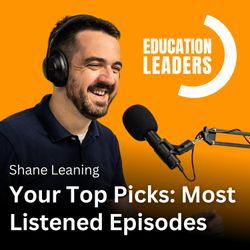
141. Your Top Picks: Most Listened Episodes
14:53||Ep. 141As 2025 comes to a close, Shane reflects on the year by counting down the five most listened to episodes of Education Leaders. The podcast has grown significantly, doubling in size just in the last six months and reaching around 150 episodes total. Whether you've been following along all year or you're brand new to the show, this episode gives you a curated guide to the conversations that resonated most with school leaders worldwide. You'll hear about episodes covering everything from mastering your interview game to understanding why teachers resist great ideas, from curriculum change implementation to the unique challenges of teacher educators. Shane shares why each episode connected with listeners, what makes them valuable, and which specific insights from Katherine Birbalsingh, Dr Ciara O'Donnell, Christopher Youles, Ben Whitaker and Orla Dempsey stood out. If you're looking for the most impactful conversations from the year or want to catch up on episodes you might have missed, this countdown will guide you to exactly what busy school leaders found most useful. Resources & Links Mentioned:Master Your Leadership Interview Game | A Conversation with Orla DempseyHow To Learn From Everyone | A Conversation with Ben WhitakerWhy Teachers Resist your Great Ideas | A Conversation with Christopher YoulesWhen Teachers Teach Teachers | A Conversation with Dr. Ciara O'DonnellLeading With Conviction | A Conversation with Katharine BirbalsinghEducation Leaders Live bonus episodes with Chris Scorer Episode PartnersInternational Centre for Coaching in Education (Use discount code SHANE5 for 5% off)International Curriculum Association
140. School Character and Culture First | A Conversation with Tamara Yuill Proctor
28:49||Ep. 140When Dr. Tamara Yuill Proctor began researching curriculum integration at secondary level, she quickly discovered that successful change wasn't really about curriculum at all. It was about understanding the character and culture of the school first: the people, their capacity, the school's history, and what the community actually needs. In this conversation, Tam shares findings from her doctoral research into how schools create meaningful change, focusing on a New Zealand school that hadn't changed its timetable in 25 years yet managed to transform its approach to learning. You'll learn why every change initiative Tam has led takes exactly six months for teachers to build the relational trust needed to collaborate effectively, how to balance being adaptable with staying mission-focused, and why "pockets of change" work better than whole-school transformation. Tam explains the critical role of middle leaders as conduits between vision and classroom practice, shares practical advice on giving teachers space to be frustrated during change, and reveals why clear learning outcomes matter more than rigid plans. If you're leading any kind of school change - whether curriculum redesign, new systems, or pedagogical shifts - this episode will help you understand why the human elements matter most. Resources & Links Mentioned:Tam on LinkedInUWC Changshu China Episode PartnersInternational Centre for Coaching in Education (Use discount code SHANE5 for 5% off)International Curriculum Association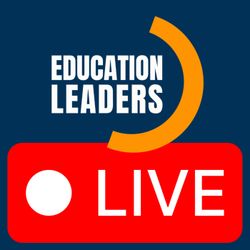
139. LIVE | December Reflections
56:08||Ep. 139Welcome to our December edition of Education Leaders LIVE, where Chris Scorer and Shane Leaning reflect on the month's episodes. This time we reviewed three conversations that sparked some genuine debate between us. From firefighting versus long-term thinking, to whether HR should serve leadership or staff (we still don't agree), to the fundamentals of building trust quickly. We also had a surprisingly heated discussion about whether bookshelves should be organised by colour or subject matter. Chris's Christmas wish for all educators? Switch off your computers and actually rest.This monthly live show is meant to be more than just Shane and Chris chatting. It's a conversation with you, our community. Join us on the last Thursday of every month at 6pm Shanghai time (10am UK) on LinkedIn Live, YouTube Live, or at educationleaders.live.Episodes DiscussedHow to Think Long Term When Everything's On Fire https://shaneleaning.com/podcast/137Ethical School Leadership | A Conversation with Dr. Yael Cass https://shaneleaning.com/podcast/138How to Build Leadership Trust https://shaneleaning.com/podcast/139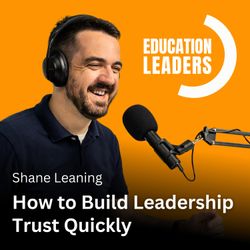
139. How to Build Leadership Trust Quickly
14:19||Ep. 139Which breaks faster: trust in someone's competence or trust in their character? Shane explores Stephen Covey's framework that trust operates on two separate dimensions. Competence trust builds quickly through credentials, positions, and demonstrated capability, but character trust takes time to develop through consistent honesty and integrity. The crucial insight? While competence breaks slowly with each mistake being somewhat forgivable, character trust can shatter in a single moment. Shane shares a vulnerable story from his own leadership journey about a time he broke someone's trust and the lasting impact it had on that professional relationship. You'll learn a practical three-part transparency framework that builds character trust quickly whilst you're still establishing competence. Shane explains how to share your thinking process when uncertain, admit what you don't know whilst committing to find out, and explain your decisions even when they're unpopular. This approach doesn't just build trust faster, it protects you from appearing incompetent, reduces your cognitive load as a leader, and models the honest behaviour you want from your team. If you've ever worried about looking weak by admitting uncertainty, this episode will change how you approach leadership communication. Resources & Links Mentioned: The 7 Habits of Highly Effective People by Stephen CoveyEducation Leaders Intensive - 10-week leadership programme Episode PartnersInternational Centre for Coaching in Education (Use discount code SHANE5 for 5% off)International Curriculum Association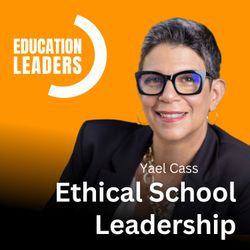
138. Ethical School Leadership | A Conversation with Dr Yael Cass
32:28||Ep. 138Compliance feels safer than ethics. You can tick the boxes, point to the policies, and stay in your head without engaging the emotional discomfort. But what if that's exactly the problem? In this episode, Dr Yael Cass introduces the concept of "compliance plus," a thoughtful, human-centred approach that brings intention and reflection into the systems schools rely on. Yael explains why international schools often have confusing organisational structures that look like "a bowl of spaghetti," why we still call operational professionals "support staff," and how the lack of clear systems triggers what she calls organisational sensemaking, where people start thinking about threats to themselves rather than collective goals. You'll learn why job descriptions in most schools haven't been reviewed in years even though roles have completely evolved, how professional development decisions are often made based on visibility or personal rapport with leadership rather than clear criteria, and why giving HR real strategic authority could reduce the overwhelming administrative load on principals and heads of school. Yael shares practical steps: look for gaps between what's written and what's actually happening, audit one area like recruitment for alignment with your values, and send an anonymous survey asking whether your appraisal system actually supports people or just ticks boxes. This conversation challenges how you think about structure, fairness, and what it means to build a workplace where the people who serve your students can actually flourish. Resources & Links Mentioned:Dr Yael Cass and NexGen Talent GroupDr Yael Cass on LinkedInEpisode PartnersInternational Centre for Coaching in Education (Use discount code SHANE5 for 5% off)International Curriculum Association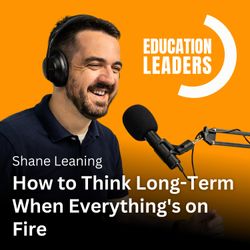
137. How to Think Long-Term When Everything's on Fire
16:54||Ep. 137Your budget's been slashed, three teachers have resigned, parents are complaining about the new timetable, and someone's asking about your five-year strategic plan. Sound familiar? This episode tackles the leadership trap that stops brilliant school leaders from making real progress: abandoning long-term thinking the moment a crisis hits. Shane explores why waiting for things to calm down before thinking strategically means you'll be waiting forever, and why firefighting mode becomes a dangerous default that creates more problems than it solves. You'll learn the three anchors that keep strategic leaders grounded during chaos: identifying your non-negotiables (three to five things that don't change no matter what), asking one weekly question that maintains forward momentum, and conducting a monthly review that prevents short-term decisions from creating long-term disasters. Shane shares research showing that 75% of change initiatives fail not because ideas were poor, but because organisations revert to short-term thinking under pressure. If you're exhausted from constant crisis management but frustrated that nothing's actually changing in your school, this episode will show you how to lead strategically even when everything feels urgent. Resources & Links Mentioned:FCLT Global and Harvard Law School Corporate Governance Forum researchMcKinsey 2017 study on long-term thinkingBoston Consulting Group research on organisational change Episode PartnersInternational Centre for Coaching in Education (Use discount code SHANE5 for 5% off)International Curriculum Association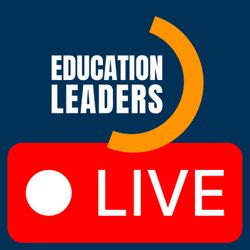
136. LIVE | November Reflections
43:57||Ep. 136This month's Education Leaders LIVE brings together the big themes from November's episodes. Chris and Shane dig into what trust actually looks like in schools, why the shift from scrutiny to development matters so much, and whether leaders at trust level can genuinely connect with classroom teachers. The conversation around Sam Gibbs' episode sparks a proper debate about loss aversion and what happens when teachers stop putting themselves out there because they're tired of being judged. There's also honest reflection on Jo Robinson's coaching insights and what it means to be proactive rather than reactive as a leader.The discussion gets particularly real when they tackle the "have you got a moment" problem. Is it selfish to protect your focus time? How do you balance being available with actually getting strategic work done? Chris and Shane explore the tension between open-door policies and the reality that leaders need thinking space too. Plus, they revisit Maureen and James' work on student leadership and why we shouldn't treat leadership as something kids either have or don't.Episodes discussed:Teaching Leadership Through Curriculum with James Simons and Maureen ChapmanHave You Got A Moment?Coaching For School Leaders with Jo RobinsonHow to Trust Your Teachers with Sam Gibbs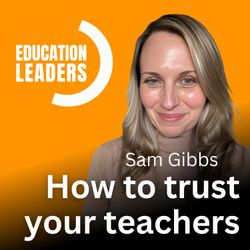
136. How to Trust Your Teachers | A Conversation with Sam Gibbs
33:51||Ep. 136When Sam Gibbs asked, "Are we any further forward in honestly trusting the teaching profession?", she hit on something uncomfortable. In too many schools, we've slipped into what Sam calls toxic accountability. Sam, Director of Education at Greater Manchester Education Trust and co-author of The Trouble With English, argues that school leaders need to start from one simple assumption: teachers are professionals who want to do right by children. This conversation gets into why we've become unhealthily dependent on external products, how to use evidence without ignoring what teachers know works in their classrooms, and why that matters for actually changing practice. You'll hear why buying a programme before identifying your real problem creates dependency, how Sam's trust builds internal expertise through "mindful practice", and what it means to create a culture where teachers actually think, reflect, collaborate, learn, and develop. Shane and Sam discuss how narrow definitions of excellence hinder schools, why a chat over the kettle can be more effective than another external training session, and how to work with consultants without relying on them indefinitely. If you're trying to build professional development that doesn't just disappear after the initial excitement, this conversation provides a starting point. Resources & Links Mentioned:Sam Gibbs on LinkedInTrust Wide CPD Leaders NetworkThe Trouble With English and How to Address It (Routledge, 2022) Episode PartnersInternational Centre for Coaching in Education (Use discount code SHANE5 for 5% off)International Curriculum Association
135. Coaching For School Leaders | A Conversation with Joanne Robinson
27:47||Ep. 135When Jo Robinson joins Shane, they focus on a simple, urgent problem: too much of what passes for professional development in schools is one-off, inspirational, and then forgotten. Jo — Chief Programmes Officer at the International Centre for Coaching in Education — gives school leaders practical steps to move from occasional workshops to coaching-led development that actually improves teaching and retention. You’ll learn concrete moves you can make straight away: how to replace single observation feedback with short coaching conversations, how to set small monitored goals that staff will actually keep, and how to gather a fuller picture of practice by triangulating evidence rather than relying on one visit. Shane and Jo discuss examples from international schools, the role of accredited coaching programmes for leaders, and simple templates you can adopt this term to protect staff time while growing expertise. Press play if you want a practical plan for making leadership development stick. Resources & Links Mentioned: International Centre for Coaching in Education (ICCE)Joanne Robinson on LinkedInEEF Guidance: Effective Professional Development (practical evidence for PD design) Episode PartnersInternational Centre for Coaching in Education (Use discount code SHANE5 for 5% off)International Curriculum Association